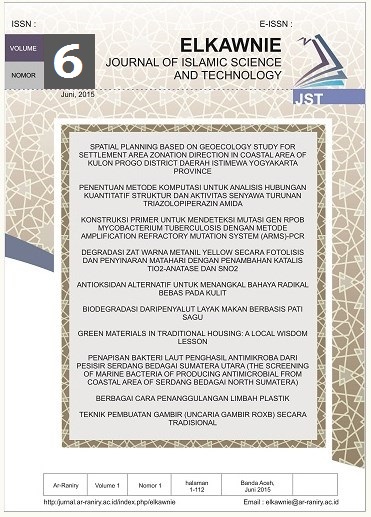Usability Evaluation of Islamic Learning Mobile Applications
DOI:
https://doi.org/10.22373/ekw.v6i1.5920Keywords:
Mobile Application, Usability, Islamic Mobile Application, User Interface, Education, ChildrenAbstract
Abstract : The trend of using mobile devices for the purpose of learning is gaining momentum. Apart from traditional education, various applications are being developed for religious learning. Pakistan is inhabited by around 98% of Muslims. Hence, the informal learning of Islam is essential for Muslim child development. This research presents a usability study of different Islamic learning mobile applications available on the android platform for children. The purpose of this research is to evaluate the usability of different Islamic learning mobile applications for children of diverse age groups in order to understand what design principles must be followed that increase the usability of the application. The main focus of this research is to observe and evaluate how easily children of different age groups respond to different applications, how effectively the children understand the core features of the applications and how easily they are able to use the application by themselves.
References
Alqahtani, M. and Mohammad, H. (2015). Mobile applications' impact on student performance and satisfaction. Turkish Online Journal of Educational Technology-TOJET, 14(4), 102-112.
Amen, B., Mahmood, S. and Lu, J. (2015). Mobile application testing matrix and challenges. Computer Science & Information Technology, 27-40.
Ansari, M.S. and Tripathi, A. (2017). An investigation of effectiveness of mobile learning apps in higher education in India. International Journal of Information Studies and Libraries.
Az-zahra, H.M., Pinandito, A. and Tolle, H. (2015), August. Usability evaluation of mobile application in culinary recommendation system. In 2015 IEEE Asia Pacific Conference on Wireless and Mobile (APWiMob), 89-94.
Basal, A., Yilmaz, S., Tanriverdi, A. and Sari, L. (2016). Effectiveness of mobile applications in vocabulary teaching. Contemporary Educational Technology, 7(1), 47-59.
Caro-Alvaro, S., Garcia-Lopez, E., Garcia-Cabot, A., de-Marcos, L. and Gutierrez-Martinez, J.M. (2017). A systematic evaluation of Mobile applications for instant messaging on iOS devices. Mobile Information Systems.
Cata, T. and Martz, B. (2015). Comparing mobile APPs usability characteristics for designers and users. Journal of International Technology and Information Management, 24(4), 4.
Crespo, J.A. (1996). Comportamiento electoral: cultura política y racionalidad en los comicios de 1994. Nueva antropología, 15(50), 23-48.
Fernández-Lao, C., Cantarero-Villanueva, I., Galiano-Castillo, N., Caro-
Morán, E., Díaz-Rodríguez, L. and Arroyo-Morales, M. (2016). The effectiveness of a mobile application for the development of palpation and ultrasound imaging skills to supplement the traditional learning of physiotherapy students. BMC medical education, 16(1), 274.
Hameed, A., Ahmed, H.A. and Bawany, N.Z. (2019). Survey, Analysis and Issues of Islamic Android Apps. Elkawnie, 5(1), 1-15.
Hussain, A., Mkpojiogu, E.O., Musa, J.A. and Mortada, S. (2017), October. A user experience evaluation of amazon kindle mobile application. In AIP conference proceedings, AIP Publishing LLC, 1891(1), 020060.
Kotzé, P., Marsden, G., Lindgaard, G., Wesson, J. and Winckler, M. eds. (2013). Human-computer Interaction. Proceedings INTERACT 2013: 14th IFIP TC 13 International Conference, Cape Town, South Africa, 8120.
Leung, R.A. (2011). Improving the learnability of mobile devices for older adults (Doctoral dissertation, University of British Columbia).
Leung, R., McGrenere, J. and Graf, P. (2008). The learnability of mobile application interfaces needs improvement. In Proc. of British HCI Workshop on HCI and the Older Population.
McWhorter, R.R. (2014). A synthesis of new perspectives on Virtual HRD. Advances in Developing Human Resources, 16(3), 391-401.
Moumane, K., Idri, A. and Abran, A. (2016). Usability evaluation of mobile applications using ISO 9241 and ISO 25062 standards. SpringerPlus, 5(1), 548.
Olubusola, A.O. (2015). User satisfaction in mobile applications. Research Paper at School of Computer Science, University of Birmingham. Retrieved from.
Özata, F.Z. (2015). Determinants of user satisfaction with mobile applications: case of facebook as a mobile app in Turkey. In Proceedings of Business and Management Conferences (No. 2304356). International Institute of Social and Economic Sciences.
Sajedi, A., Afzali, H. and Mahdavi, M. (2008). Improving learnability and usability of software applications. In Proceedings of IADIS IHCI, International Conference on Interfaces and Human Computer Interaction.
Shu, Y. and Yan, J. (2008). New fluids prevent formation damage to Tarim sandstones. Oil & gas journal, 106(19), 45-49.
Zahra, F., Hussain, A. and Mohd, H. (2017). October. Usability evaluation of mobile applications; where do we stand?. In AIP Conference Proceedings, AIP Publishing LLC, 1891(1), 020056.
Downloads
Additional Files
Published
Issue
Section
License
Proposed Policy for Journals That Offer Open Access Authors who publish with the Elkawnie journal agree to the following terms:
a. Authors retain copyright and grant the journal right of first publication with the work simultaneously licensed under a Creative Commons Attribution License that allows others to share the work with an acknowledgement of the work's authorship and initial publication in this journal.
b. Authors are able to enter into separate, additional contractual arrangements for the non-exclusive distribution of the journal's published version of the work (e.g., post it to an institutional repository or publish it in a book), with an acknowledgement of its initial publication in this journal.
c. Authors are permitted and encouraged to post their work online (e.g., in institutional repositories or on their website) prior to and during the submission process, as it can lead to productive exchanges, as well as earlier and greater citation of published work (see The Effect of Open Access).

























